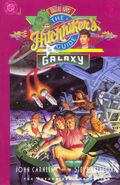Hitchhiker's Guide to the Galaxy is the first and only volume of the Prestige format, limited series, three-part comic book adaptation of the novelisation of The Hitchhiker's Guide to the Galaxy, published by DC Comics in 1993. It closely follows the original story of Arthur Dent navigating the destruction of Earth and his adventures throughout the Universe with his friend Ford Prefect, who is a journalist for The Hitchhiker's Guide to the Galaxy.
Issues[]
Issue 1[]
Official Description[]
All Arthur Dent wants is for the guys with the bulldozers not to demolish his house to make way for a freeway bypass. Ford Prefect, interstellar gadabout and roving researcher for the most remarkable book in the universe - THE HITCHHIKER'S GUIDE TO THE GALAXY - rescues Arthur just as the alien Vogons are demolishing Earth to make way for a hyperspace bypass. The duo take refuge within the clutches of the same Vogon wrecking crew, and Ford's advice to Arthur on this and any other setback is simple: Carry a towel and Don't Panic! THE HITCHHIKER'S GUIDE TO THE GALAXY has all the answers anybody needs to get the most out of an interstellar romp. Towels ready, Babel fish in their ears, Ford and Arthur stumble from one hopeless situation to another, abetted and abused by a two-headed spaceship thief named Zaphod Beeblebrox, his alluring companion Trillian and their manic-depressive robot, Marvin.
Characters[]
- Arthur Dent
- Mr. Prosser
- Ford Prefect
- Prostetnic Vogon Jeltz
- Trillian
- Zaphod Beeblebrox
- Marvin
- Fenchurch
Issue 2[]
Official Description[]
Arthur Dent and Ford Prefect are rescued from the vacuum of space by the two-headed, three-armed Zaphod Beeblebrox, the alluring Trillian and Marvin the depressed robot in a spaceship controlled by the Infinite Probability Drive. But their troubles are only just beginning as Zaphod sets course for the legendary planet Magrathea.
Characters[]
Issue 3[]
Official Description[]
On the planet Magrathea, Arthur and his companions learn the origin of the Earth...and the part played by mice in the search for the answer to life, the universe and everything.
Characters[]
Gallery[]
Notes[]
- Douglas Adams was known to be unhappy with the use of American English spellings and idioms in what he felt was a very British story, and never fully supported the American comic book adaptions.



